#philosophical discourse
Explore tagged Tumblr posts
Text
A Review of "The Eleusinian and Bacchic Mysteries" by Thomas Taylor
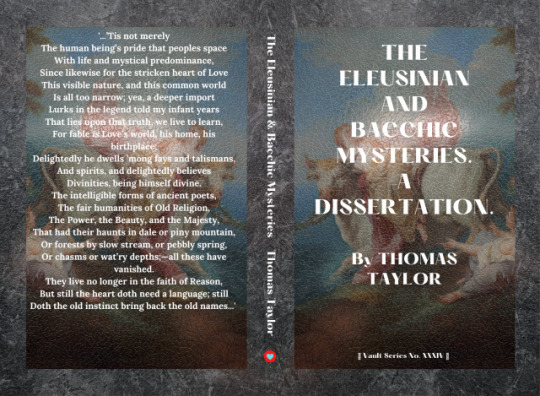
"The Eleusinian and Bacchic Mysteries" is an illuminating journey into the heart of ancient Greek religious practices, meticulously explored and vividly presented by the renowned philosopher and translator, Thomas Taylor. This dissertation, complemented by the evocative illustrations of A. L. Rawson, takes readers on a profound exploration of the mystical rituals that shaped the spiritual landscape of ancient Greece.
Thomas Taylor's scholarly expertise in Neoplatonism and his unwavering dedication to preserving the wisdom of the past shine brilliantly in this work. Through his meticulous translation and commentary, Taylor unveils the enigmatic rites and ceremonies of the Eleusinian and Bacchic Mysteries, providing readers with a window into the spiritual world of ancient Greece.
One of the most remarkable aspects of Taylor's work is his ability to convey the deep spiritual significance of these ancient rituals. He delves into the symbolism, mythology, and metaphysical underpinnings of the Mysteries, revealing how they were designed to facilitate personal transformation and spiritual enlightenment. Taylor's profound insights into the mysteries' inner workings give readers a profound understanding of their purpose and significance.
The accompanying illustrations by A. L. Rawson add another layer of richness to this dissertation. Rawson's artistry brings to life the mystical and mythological elements of the rituals, making the ancient world tangible and captivating. These illustrations serve as a visual guide, enhancing the reader's comprehension and engagement with the material.
"The Eleusinian and Bacchic Mysteries" is not merely a historical account but a spiritual odyssey. It invites readers to contemplate the enduring relevance of these ancient practices in the modern world. Taylor's work inspires us to reflect on the importance of initiation, transformation, and the quest for spiritual truth.
In conclusion, "The Eleusinian and Bacchic Mysteries" is a masterpiece of scholarship and spiritual insight. Thomas Taylor's dedication to preserving the wisdom of antiquity and his ability to convey its profound significance make this dissertation an invaluable resource for anyone interested in the spiritual and mystical traditions of ancient Greece. A. L. Rawson's illustrations add a visually captivating dimension to this already enlightening work. It is a must-read for seekers of wisdom, scholars, and those fascinated by the mysteries of the past.
"The Eleusinian and Bacchic Mysteries" by Thomas Taylor is available in Amazon in paperback 13.99$ and hardcover 19.99$ editions.
Length of the Book: 184 pages
Language: English
Rating 8/10
Link of the book!
Review by King's Cat
#Ancient Greek Mysteries#Eleusinian Mysteries#Bacchic Mysteries#Neoplatonism#Spiritual Enlightenment#Rituals and Ceremonies#Symbolism and Mythology#Spiritual Transformation#Thomas Taylor#A. L. Rawson#Ancient Greek Religion#Mystical Traditions#Spiritual Wisdom#Initiation#Metaphysical Insights#Illustrations of Ancient Rituals#Philosophical Discourse#Esoteric Knowledge#Spiritual Quest#Historical Dissertation
5 notes
·
View notes
Text
Illuminating the Shadows: The Legendary Assembly That Shaped a Golden Age.
Sanjay Kumar Mohindroo Sanjay Kumar Mohindroo. skm.stayingalive.in A sweeping narrative of an era’s brilliant scholars, their timeless lessons, and the enduring spirit that turned mistakes into transformative wisdom. #SurrealReflections #HouseOfWisdom #IslamicGoldenAge #AncientWisdom #Philosophy #History #Science #Mathematics #Astronomy #CulturalExchange #Enlightenment #Inspiration…
#Abbasid Caliphate#Al-Farabi#Al-Khwarizmi#Al-Kindi#Al-Razi#Arabic translations#Baghdad#cultural exchange#global scholarship#golden era#historical legacy#House of Wisdom#Ibn al-Haytham#Ibn Sina#intellectual tradition#Islamic Golden Age#medieval science#mistakes as lessons#News#philosophical discourse#Sanjay Kumar Mohindroo#universal knowledge
0 notes
Text
Delving into Poetic Wisdom: A Review of "On the Art of Poetry" by Aristotle
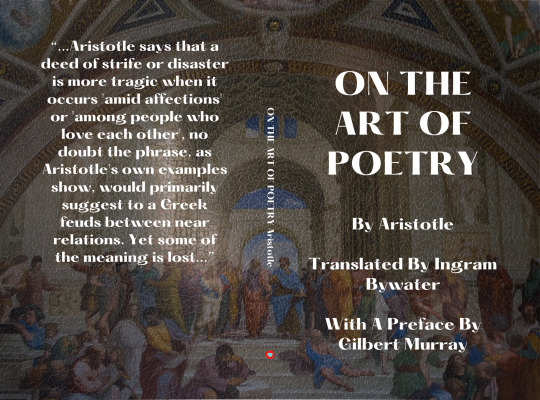
Aristotle's "On the Art of Poetry," translated by Ingram Bywater, stands as a seminal work in literary criticism, offering profound insights into the nature and function of poetry that continue to resonate with readers and scholars alike. Written in the 4th century BCE, this treatise serves as a comprehensive examination of the principles and techniques that underlie the creation of poetry, providing valuable guidance for poets and readers alike.
At its core, "On the Art of Poetry" is a testament to Aristotle's keen intellect and analytical prowess. In this work, Aristotle explores the various elements that contribute to the effectiveness of poetry, including plot, character, diction, and spectacle. Through his systematic analysis, Aristotle seeks to uncover the universal principles that govern the art of poetry, shedding light on its essential nature and its role in human society.
One of the most compelling aspects of "On the Art of Poetry" is Aristotle's emphasis on the importance of mimesis, or imitation, in poetry. According to Aristotle, poetry is a form of imitation that seeks to represent the actions, emotions, and experiences of human life. Through the skillful use of language and imagery, poets are able to create a vivid and lifelike portrayal of the world, inviting readers to engage with their work on a profound emotional and intellectual level.
Moreover, "On the Art of Poetry" offers valuable insights into the principles of dramatic structure and the role of catharsis in tragedy. Aristotle argues that tragedy is a form of poetry that evokes feelings of pity and fear in the audience, leading to a purgation or cleansing of these emotions. Through the depiction of the fall of a tragic hero, tragedy allows audiences to confront their own mortality and the fragility of human existence, ultimately leading to a deeper understanding of the human condition.
In addition to its exploration of tragedy, "On the Art of Poetry" also examines the principles of comedy and epic poetry, providing valuable guidance for poets working in these genres. Aristotle discusses the importance of unity of plot, character, and theme in epic poetry, as well as the role of humor and satire in comedy. Through his analysis, Aristotle highlights the diversity of poetic forms and the unique challenges and opportunities that each genre presents to the poet.
In conclusion, "On the Art of Poetry" by Aristotle is a timeless classic that continues to inspire and enlighten readers with its profound insights into the nature of poetry. Aristotle's systematic approach to literary criticism, coupled with his keen observations and analytical rigor, make this work an indispensable resource for anyone interested in the art of poetry. With its timeless wisdom and enduring relevance, "On the Art of Poetry" remains a cornerstone of literary theory and a testament to the enduring power of poetic expression.
Aristotle's "On the Art of Poetry," is available in Amazon in paperback 12.99$ and hardcover 18.99$ editions.
Number of pages: 116
Language: English
Rating: 10/10
Link of the book!
Review By: King's Cat
#Dramatic structure#Tragedy#Catharsis#Comedy#Epic poetry#Unity of plot#Characterization#Diction#Spectacle#Poetics#Aesthetic principles#Greek literature#Philosophical discourse#Aristotle's theory#Literary analysis#Poetic form#Emotion#Human experience#Morality#Ethics#Aesthetics#Universal principles#Literary genres#Rhetoric#Imagination
1 note
·
View note
Text
Absolute Monism
Singularity is the same as MultiplicityIn the vast expanse of philosophical discourse, few concepts challenge the contours of human understanding as the idea of Absolute Monism. At its core, it posits that everything is essentially a unified, singular reality, but herein lies a paradox: If all is One, how does one account for the seemingly infinite multiplicity that populates our universe? The…

View On WordPress
#absolute monism#Big Bang#cosmic singularity#cosmic story#cyclical existence#duality paradox#finite#hologram#human perception#illusion of separation#infinity#Interconnectedness#multiplicity#philosophical discourse#shared journey#Singularity#unified reality
0 notes
Text
Javert is one of the funniest characters ever like. Man really is so black and white that once he processed that ACAB he really went…. ‘I am cop,,, therefore,,, I am bastard,,, therefore,,,’ only to then immediately address this by throwing himself off a bridge. Flawless praxis tbh
#y’know except in all the 200k fics where valjean finds him and they have philosophical discourse for 100k words#and then fuck nasty for the remaining 100k#ugh I love this song!!!!!#valvert#les mis#javert#les mierables
847 notes
·
View notes
Text
Just saw a radfem actually say “Male philosophers just talk about things ten-year-old girls discuss at sleepovers.”
Sure Jan. Typical sleepover itinerary: pizza and movie, pillow fight, debate the epistemic validity of inductive reasoning. Hey can someone point me to some fourth-grade girls having a sleepover? I’d like their help coming up with a concise summary of the master-slave dialectic and existential “thrownness”. Apparently they’ve also all worked out the Problem of Universals?
#'anything i don't understand is simple and probably unimportant'#things that ain't so#i guess this is discourse#salty philosopher#people who dismiss philosophy just find themselves mired in bad philosophy
49 notes
·
View notes
Text
if the people who debate over the whole batman vs red hood ideological differences knew even the first thing about anarchist philosophy my life would be so much easier. we could be skipping so many steps.
#sometimes fandom recreates to a smaller scale#discourse that has already happened historically in a political scale#and we all just pretend like. that isn't what is happening.#like people willbe reading the comics about What the Fuck Does Justice Mean#and somehow ignore the centuries of philosophical discussion about precisely that#all of which have been over this !! in a wealth occasions !!#where the fuck do you think the ''does the end justify the means?'' debate comes from?#red hood#jason todd
78 notes
·
View notes
Text
I always wonder what made bait blogs deactivate
Was it guilt? Did an ask get through to you? Which part managed to touch your cold heart?
Or does the fabled tumblr shadow ban feature actually exist, and you're still there, spewing nonsense into the deep void, never to be seen or heard from again?
I need to know
21 notes
·
View notes
Text


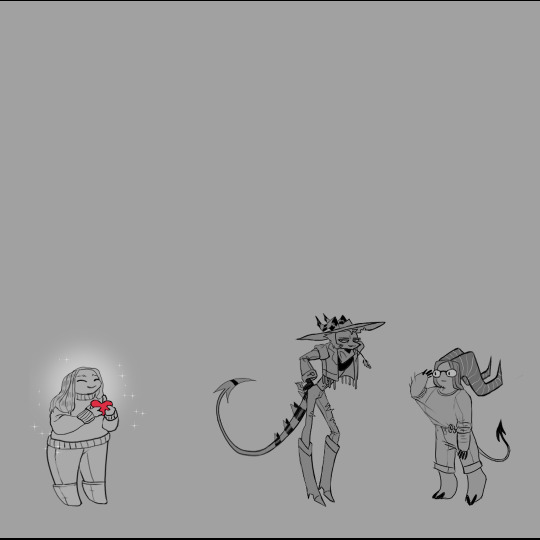
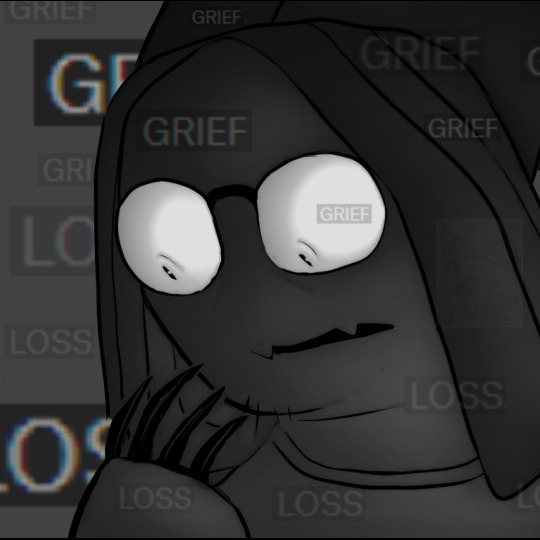
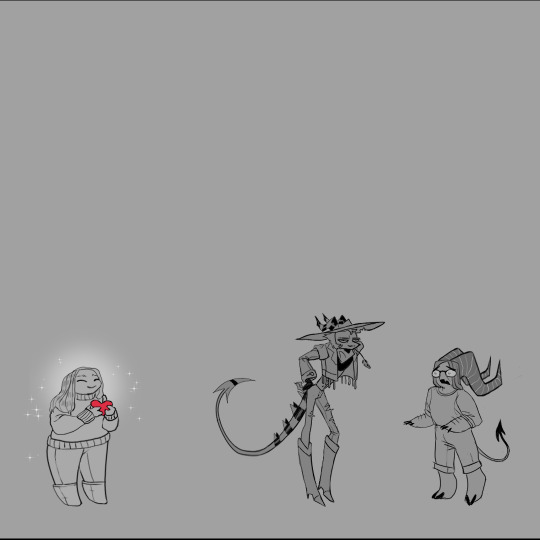
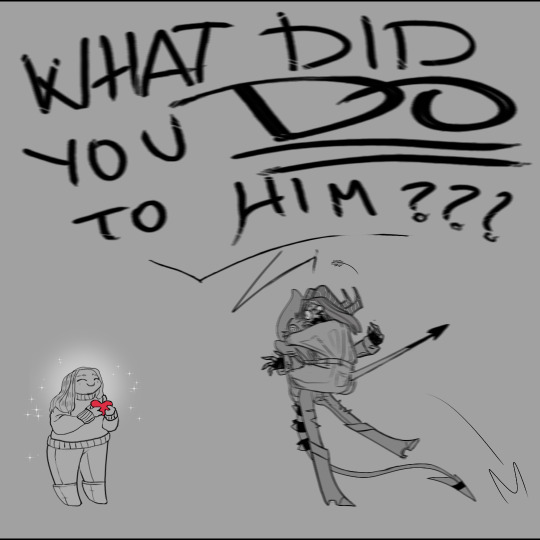
wink of god
#helluva boss#helluva striker#vivienne medrano#vivziepop#ngl i've long harbored the chewing suspicion that striker's backstory would be treated as a gag or punchline#yet this one brush of deific finger over surface waters of ever-brewing striker aficionado community discourse#( discourse like what the greek philosophers had in their there forums )#has dispelled such worries#oh we will get that tragic backstory#and it's gonna fucking tear going in
185 notes
·
View notes
Text
Delving into Poetic Wisdom: A Review of "On the Art of Poetry" by Aristotle
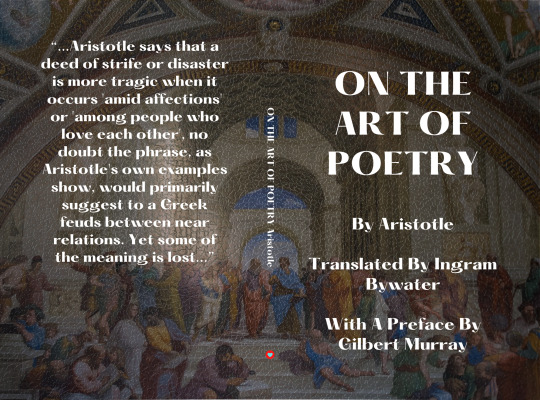
Aristotle's "On the Art of Poetry," translated by Ingram Bywater, stands as a seminal work in literary criticism, offering profound insights into the nature and function of poetry that continue to resonate with readers and scholars alike. Written in the 4th century BCE, this treatise serves as a comprehensive examination of the principles and techniques that underlie the creation of poetry, providing valuable guidance for poets and readers alike.
At its core, "On the Art of Poetry" is a testament to Aristotle's keen intellect and analytical prowess. In this work, Aristotle explores the various elements that contribute to the effectiveness of poetry, including plot, character, diction, and spectacle. Through his systematic analysis, Aristotle seeks to uncover the universal principles that govern the art of poetry, shedding light on its essential nature and its role in human society.
One of the most compelling aspects of "On the Art of Poetry" is Aristotle's emphasis on the importance of mimesis, or imitation, in poetry. According to Aristotle, poetry is a form of imitation that seeks to represent the actions, emotions, and experiences of human life. Through the skillful use of language and imagery, poets are able to create a vivid and lifelike portrayal of the world, inviting readers to engage with their work on a profound emotional and intellectual level.
Moreover, "On the Art of Poetry" offers valuable insights into the principles of dramatic structure and the role of catharsis in tragedy. Aristotle argues that tragedy is a form of poetry that evokes feelings of pity and fear in the audience, leading to a purgation or cleansing of these emotions. Through the depiction of the fall of a tragic hero, tragedy allows audiences to confront their own mortality and the fragility of human existence, ultimately leading to a deeper understanding of the human condition.
In addition to its exploration of tragedy, "On the Art of Poetry" also examines the principles of comedy and epic poetry, providing valuable guidance for poets working in these genres. Aristotle discusses the importance of unity of plot, character, and theme in epic poetry, as well as the role of humor and satire in comedy. Through his analysis, Aristotle highlights the diversity of poetic forms and the unique challenges and opportunities that each genre presents to the poet.
In conclusion, "On the Art of Poetry" by Aristotle is a timeless classic that continues to inspire and enlighten readers with its profound insights into the nature of poetry. Aristotle's systematic approach to literary criticism, coupled with his keen observations and analytical rigor, make this work an indispensable resource for anyone interested in the art of poetry. With its timeless wisdom and enduring relevance, "On the Art of Poetry" remains a cornerstone of literary theory and a testament to the enduring power of poetic expression.
Aristotle's "On the Art of Poetry," is available in Amazon in paperback 12.99$ and hardcover 18.99$ editions.
Number of pages: 116
Language: English
Rating: 10/10
Link of the book!
Review By: King's Cat
#Aristotle#Poetry#Literary criticism#Mimesis#Imitation#Dramatic structure#Tragedy#Catharsis#Comedy#Epic poetry#Unity of plot#Characterization#Diction#Spectacle#Poetics#Aesthetic principles#Greek literature#Philosophical discourse#Aristotle's theory#Literary analysis#Poetic form#Emotion#Human experience#Morality#Ethics#Aesthetics#Universal principles#Literary genres#Rhetoric#Imagination
3 notes
·
View notes
Text
A Review of "The Eleusinian and Bacchic Mysteries" by Thomas Taylor
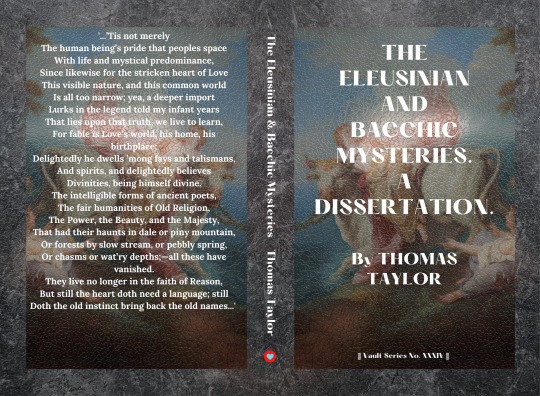
"The Eleusinian and Bacchic Mysteries" is an illuminating journey into the heart of ancient Greek religious practices, meticulously explored and vividly presented by the renowned philosopher and translator, Thomas Taylor. This dissertation, complemented by the evocative illustrations of A. L. Rawson, takes readers on a profound exploration of the mystical rituals that shaped the spiritual landscape of ancient Greece.
Thomas Taylor's scholarly expertise in Neoplatonism and his unwavering dedication to preserving the wisdom of the past shine brilliantly in this work. Through his meticulous translation and commentary, Taylor unveils the enigmatic rites and ceremonies of the Eleusinian and Bacchic Mysteries, providing readers with a window into the spiritual world of ancient Greece.
One of the most remarkable aspects of Taylor's work is his ability to convey the deep spiritual significance of these ancient rituals. He delves into the symbolism, mythology, and metaphysical underpinnings of the Mysteries, revealing how they were designed to facilitate personal transformation and spiritual enlightenment. Taylor's profound insights into the mysteries' inner workings give readers a profound understanding of their purpose and significance.
The accompanying illustrations by A. L. Rawson add another layer of richness to this dissertation. Rawson's artistry brings to life the mystical and mythological elements of the rituals, making the ancient world tangible and captivating. These illustrations serve as a visual guide, enhancing the reader's comprehension and engagement with the material.
"The Eleusinian and Bacchic Mysteries" is not merely a historical account but a spiritual odyssey. It invites readers to contemplate the enduring relevance of these ancient practices in the modern world. Taylor's work inspires us to reflect on the importance of initiation, transformation, and the quest for spiritual truth.
In conclusion, "The Eleusinian and Bacchic Mysteries" is a masterpiece of scholarship and spiritual insight. Thomas Taylor's dedication to preserving the wisdom of antiquity and his ability to convey its profound significance make this dissertation an invaluable resource for anyone interested in the spiritual and mystical traditions of ancient Greece. A. L. Rawson's illustrations add a visually captivating dimension to this already enlightening work. It is a must-read for seekers of wisdom, scholars, and those fascinated by the mysteries of the past.
"The Eleusinian and Bacchic Mysteries" by Thomas Taylor is available in Amazon in paperback 13.99$ and hardcover 19.99$ editions.
Length of the Book: 184 pages
Language: English
Rating 8/10
Link of the book!
Review by King's Cat
#Ancient Greek Mysteries#Eleusinian Mysteries#Bacchic Mysteries#Neoplatonism#Spiritual Enlightenment#Rituals and Ceremonies#Symbolism and Mythology#Spiritual Transformation#Thomas Taylor#A. L. Rawson#Ancient Greek Religion#Mystical Traditions#Spiritual Wisdom#Initiation#Metaphysical Insights#Illustrations of Ancient Rituals#Philosophical Discourse#Esoteric Knowledge#Spiritual Quest#Historical Dissertation
0 notes
Text
another anti ai art argument i hate actually is the idea that because it wasn't being made with human intent/intention in general it can't be beautiful or meaningful. like there isn't beauty or meaning in the unintentional, especially when it comes to art pieces. fuck you
#obligatory 'this blog think ai art in its current form is unethical' disclaimer#but so many arguments against it are so inherently ableist or anti art in general it makes me crazy#you guys see anyone mention ai art or ai in general and immediately lose your goddamn minds it's crazy#like is the plagiarism and art theft not enough to you do you really have to turn this into a philosophical circlejerk and focus on things#that are Not Problems and Do Not Matter#i'm so tired of it lmao#ai art discourse#marshy speaks
9 notes
·
View notes
Text

FLOSTRE [to the audience]: What you're all asking yourselves is "Can he juggle?"
SOCRATES: No it's not. What we're all asking ourselves is "When will the dancing girls come on?"
FLOSTRE [ignoring Socrates, as he is only a ventriloquist's dummy]: Does this answer your question?
[Reaching behind him, Flostre pulls out no fewer than five logical propositions and hurls them one after the other into his mind. The audience gasps in amazement as he formalises, normalises, simplifies and reduces their terms, shifts quantifiers and deftly applies syllogisms, faster than wits could follow.]
MASTER OF CEREMONIES [at side of stage]: He makes it look easy, doesn't he, folks?"
[The philosopher keeps the propositions flying in coruscating arcs of reason and argument. To enthusiastic general applause he lays each one down in a chain of reasoning, from premises to the conclusion that had been implicit all along.]
MASTER OF CEREMONIES: What a philosopher!
SOCRATES: What a bore!

#Novelties and notions#writing#writers on tumblr#emil flostre#philosopher#stand up philosopher#mathematical manipulations#logical propositions#can he juggle#magic realism#logic#where are the dancing girls?#whimsicore#whimsy#humor#reason and argument#fiction#metafictional discourse#metafiction#vaudeville#original content#original writing#writeblr
8 notes
·
View notes
Text
in my perfect world everyone makes so many lesbian muses the men then have to deal with the exact same behavior when every single post ever written isn’t about dick.
#CLAWS RETRACTED.#[real talk: I’m a lesbian transmasc little enby guy. but my gender? is lesbian. it’s how I explain it. my attraction to women is a part of#my innate gender. that’s just how it is and the two things inform one another. heteronormativity is still so alive and now everyone can put#it under progressive little labels where the character is bisexual but everything that’s focused on for miles is the hetcoded shit. it’s a#cool little thing people do now. it went from when I was a kid and ‘there’s no such thing as bi you’re just confused’ to ‘everyone is bi#because it gives me points but I will never meaningfully observe the queer aspect of that identity and it can make me seem comfortable with#queer identities’. it’s lip service so much of the time. and I never ever ever say you’re only valid if you write bi characters in a#queercoded relationship. bisexuality is forever valid always even if you’ve NEVER been in a queer relationship. but this is writing and#real bisexual people (I’m not even bi I’m literally a lesbian) have experiences irl that make them feel shitty#when they see them boiled down to shallow. a lot in the same way I get upset when I see lesbian relationships brushed off or ignored in#spite of my own excitement toward the ship. MY POINT IS that lesbians are completely ignored by this point and I can say this both irl and#on here because when you live a life that excludes men from your romantic space you’re basically illegal. it drives me fucking insane. the#way anyone can make a fucking whitebread ass man on this site and their inbox will be exploding but you make a lesbian and you have to pad#quietly around because from jump you’re already worried about how people will perceive you and you KNOW they won’t be immediately welcoming.#this is an irl thing in such a big way and I’m a NEW YORKER. but the fact that this exists in the rpc? truly I miss when we just wrote and#enjoyed things and this wasn’t a cesspit of discourse instead of an actual creative community. like. I went to college to study boring#theses that couldn’t keep my attention. I slogged through litcrit theory. do I love it? yes. but some of yall really just wanna be on#debatebro YouTube and not in the actual rpc. it’s wild. everyone’s a philosopher but no one wants to meaningfully engage. and if they do#they want to in either bad faith or basically hardheaded ignorance about an issue. someone’s 2 seconds from rping destiny.#swear to fucking god if I see one person make an asm.ngold joke I will cry.]
12 notes
·
View notes
Text
I don't know if I should be worried for my own morals or if people experience love in a wildly different way, but if I were in Tel's or Penny's place, there isn't a SINGLE thing my loved one could have done to get back to me that would make me hate them. Nothing. And if I were in Ody's place, I would have fought with everything in me. Anything to at least give my loved ones closure. Anything to make sure they don't doubt even for a second that I love them with all my heart, my soul, my very essence.
#not tagging or using their names bc i don't want to be rude or start discourses#but I was a bit baffled when saw some ppl criticizing her for taking her husband back w no questions asked#or that he wasn't justified in the way he dealt with the men in the palace#mind you they were going to TORTURE his son and wife#not that you can't criticize their choices on a philosophical level of course#but I can't imagine looking at the people you love and not know it in your heart you'd do the impossível for them#sorry about the rambling I just couldn't stop thinking about this lmao
5 notes
·
View notes
Text
Wanting to write my Thoughts™/analysis of the ending(s) vs brain is soup

#also idk slightly worried about wading into some sort of discourse? haven't seen any but with this being tumblr and all#with how philosophically ripe and ambiguous everything is there is debate to be had#which is partially WHY i want to write our something but uggghhh soooouuupppp
3 notes
·
View notes